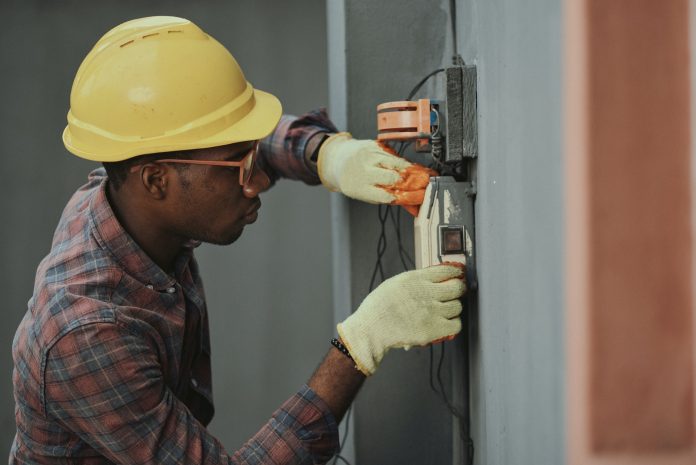When working on residential electrical projects, managers spend a lot of time planning to ensure that everything is safe and up to code before getting started.
An electrical contractor is tasked with performing many different jobs on a home electrical project. For example, they might have to install new electrical outlets, switch light fixtures, or rewire an entire house.
This article will give you a better understanding of the role of an electrical contractor and what they do on home projects.
What is an electrical contractor?
Electrical contractors are people who work independently or, more often, in the construction industry, specifically in electrical work. They specialize in working on electrical systems and machinery compared to other construction workers, who focus on more manual labor.
They must be licensed and trained to work on electrical systems and machinery. Contractors can work in various industries and are often hired to help with building renovations or new construction.
Types of electrical contractors
Low voltage contractors: Electric work for low VAC items (like computers and telephones) that require nominal voltage are the responsibility of low voltage contractors. Instead of dispersing raw electricity, these devices carry analogue signals or data. Low voltage contractors are required to hold a license in a few regions.
Electrician contractors: Electrician contractors can work in both commercial and residential settings. They are in charge of breaker box installation, outlet and switch wiring, fixture installation, and more. They must pass a test and obtain a license to begin working.
Plant contractors: Plant contractors manage and build high-voltage transmission lines between an electric company’s facilities. After receiving their license, they’re required to complete specialized and comprehensive training for various facilities. Due to the high-risk and complex nature associated with working with high voltages, competent and well-trained electricians are needed.
HVAC contractors: HVAC contractors work with cooling and heating systems, such as furnaces and air conditioners, both in commercial and residential settings. Because of its proximity to high moisture or water, as well as high voltages, HVAC equipment can be vulnerable to risk and present various hazards. Therefore, this kind of electrical work needs the expertise of competent HVAC electrical contractors. HVAC contractors must obtain a certificate and have a license to perform.
What does an electrical contractor do?
An electrical contractor is responsible for the wiring, installation, and testing of electrical systems in residential and commercial buildings.
The primary goal of an electrical contractor is to ensure that the building is safe by following all the requirements while completing a project. They might be tasked with various works, including the following.
Installing new wiring
If you’re adding a new room or extending your current electrical system, you’ll likely need to hire an electrical contractor. This is because existing wiring may not handle the demand of any additions and will need to be expanded.
Replacing existing wiring
Replacing existing wiring is also in the scope of an electrical contractor. It can include updating current wiring to meet code regulations or replacing old wiring with a new system. Electrical contractors are expected to know the safety regulations for the area they work in to ensure your wiring is up to standard.
Adding circuit breakers
If you have a lot of electronics, you’ll likely need more circuits in your home. An electrical contractor will need to be hired for the job, as circuit breaker installation requires extensive expertise.
Adding circuit breakers allows you to use more electronics so they work simultaneously without exceeding capacity. Additionally, if there’s ever a power outage in your home or neighborhood, the circuit breaker will shut off automatically so that your electronics won’t be damaged by surges.
Adding new outlets
When an electrical contractor installs a new circuit in a room, they’ll wire an additional new outlet. The process includes determining where the new outlets should go and ensuring that designated spaces are appropriately prepared. It also includes ensuring that the outlet is working correctly and that there’s no damage to the electrical box or the outlet.
Installing new switches or dimmers
One of the most common tasks that an electrical contractor will do is install new switches or dimmers. A switch or dimmer is a device that controls the flow of power to a light. These are some of the easiest things to do when wiring a house. They’re also one of the most common requests from homeowners.
HVAC wiring
If you’re building a new home or adding on to an existing one, an electrical contractor should be responsible for wiring your HVAC system. It’s essential because it ensures that your heating and cooling systems will work correctly and safely.
An electrician will also do some home inspection work while they’re there. They might find problems in other areas of the house, like faulty wiring or loose connections that could lead your HVAC system to collapse in the future. If they find any problems, they’ll be able to fix them right away.
Other wiring tasks
Apart from what’s listed above, the job of an electrical contractor also includes the following:
- Installing and repairing electrical wiring in residential, commercial, or industrial properties
- Assisting in the design of new electrical systems
- Testing installed electrical wiring to ensure it meets safety standards
- Repairing or replacing damaged power lines
- Maintaining existing electrical systems
Electrical contractors are essential
Whether it’s for home renovation or construction projects, anything that involves electrical work (from installing circuits and power outlets to wiring lights) will require the expertise of an electrical contractor.
However, it’s not always easy to find the right contractor. When you hire an electrician, you must ensure that you’ll be getting the highest quality work for your investment. You may be tempted to hire a low-cost contractor to save some money, but this is not advisable.
Electricians who offer lower rates might cut corners or use less reliable materials that won’t last as long as higher-quality materials.
It’s usually better to invest in hiring the right person at the start of the project so they can do the job well without having to worry about making cuts or using cheaper materials. That way, you’ll get what you pay for.
Find a Home-Based Business to Start-Up >>> Hundreds of Business Listings.
















































